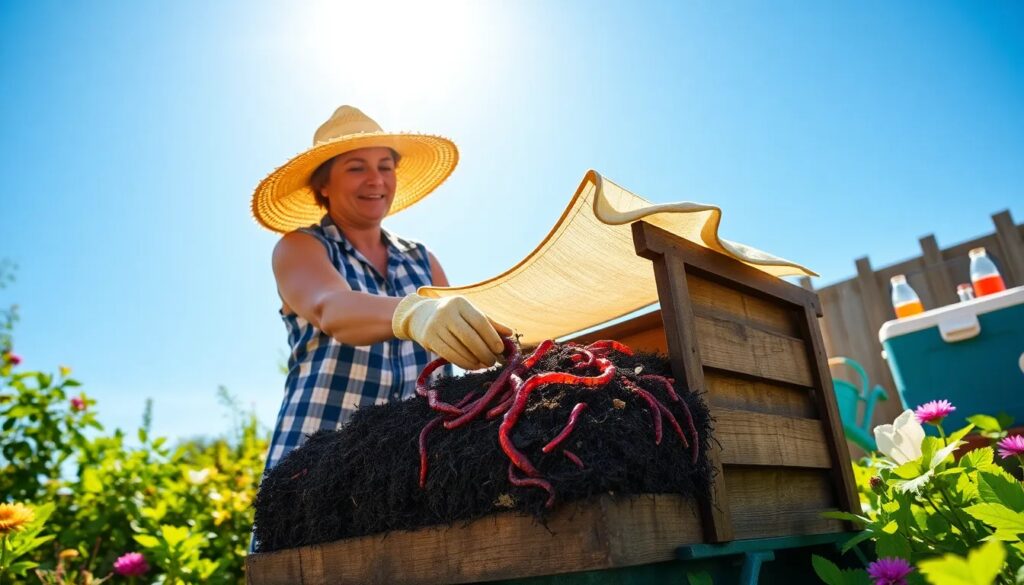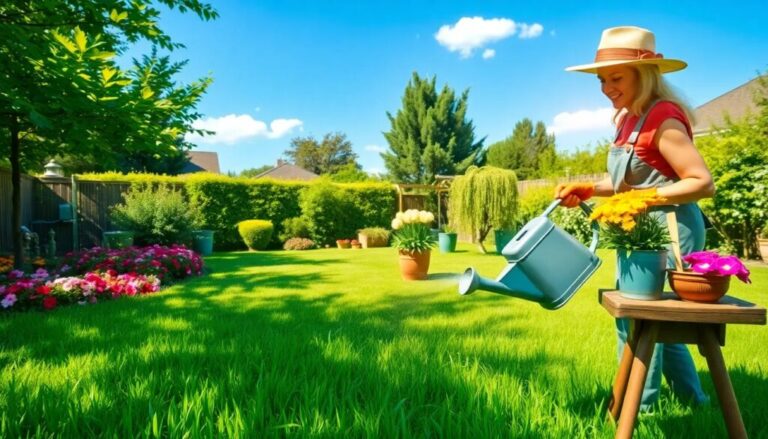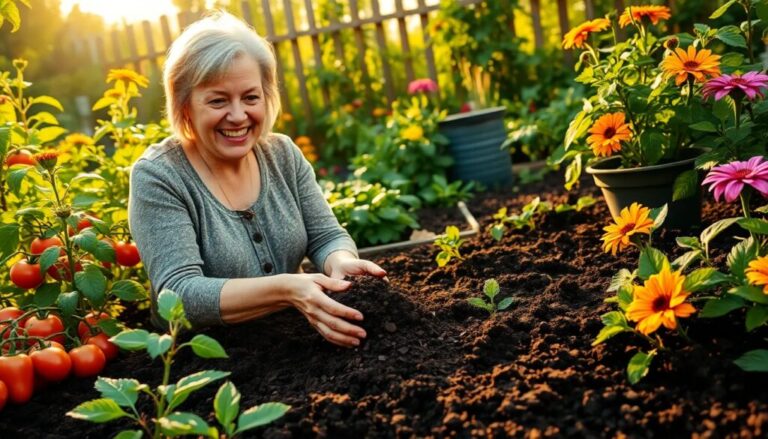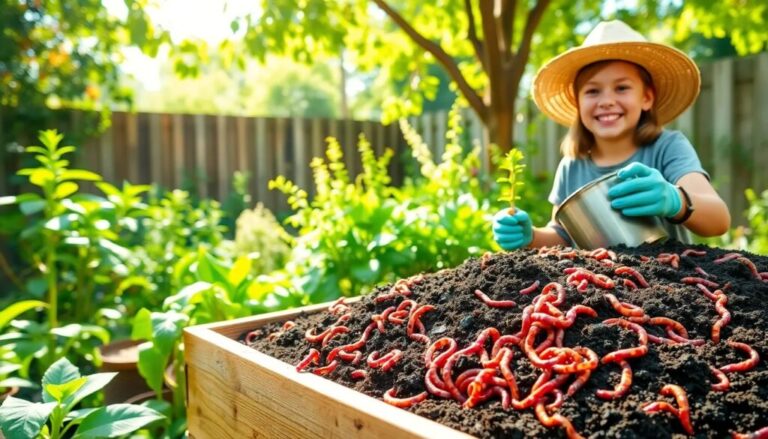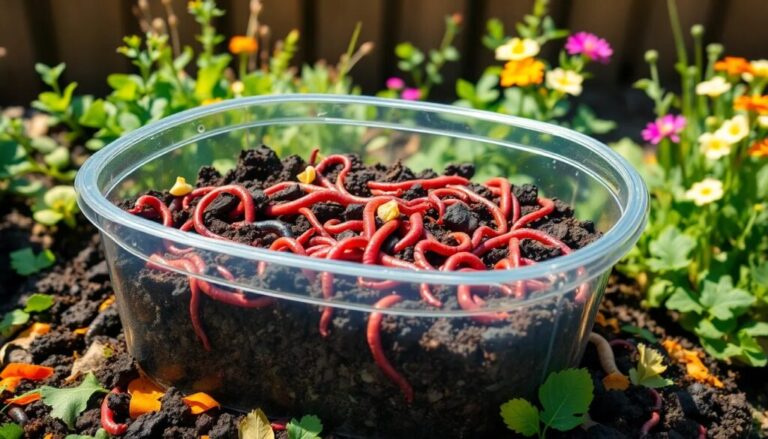Keeping composting worms cool in the summer
Summer can be challenging for vermicomposting enthusiasts, as extreme heat can affect the health of compost worms. Knowing how to keep compost worms cool during the summer is essential for their survival and optimal performance.
Worms thrive in moderate temperatures, and with a little care, you can keep your composter in ideal conditions even on the hottest days.
How to protect your worm bin from the heat?
Protecting your composter from the heat is essential. First, consider the location of your bin. Keeping it in a shaded area during the hottest hours of the day can make a big difference.
In addition, it is important to increase the moisture content of the substrate. You can do this by using covering materials such as cardboard or mulch, which help retain moisture and provide additional shade.
- Place your bin in an area with natural shade.
- Use materials to cover the surface of the bin.
- Reduce the amount of food you add to prevent the internal temperature from rising.
You may also want to consider moving your composter to a cooler location during heat waves. This may simply mean bringing it inside your home or to a cool basement.
What temperature is ideal for composting worms?
Composting worms thrive in temperatures ranging from 59°F to 77°F. However, they can begin to suffer from heat stress at temperatures above 90°F.
When temperatures exceed 95°F, the risk of mortality increases significantly. Therefore, it is crucial to monitor the temperature of your composter and act quickly if increases are detected.
Installing a thermometer in your bin can help you better manage conditions. If you notice that the temperature is rising, it’s time to implement cooling strategies.
How can you keep worms cool indoors during summer?
If you decide to move your composter indoors, be sure to choose a location with good ventilation and moderate temperatures. Keeping the air circulating is essential to prevent the internal temperature from rising.
Another strategy is to use damp blankets over the bin, which can help cool the surface and maintain moisture. Alternatively, cloth covers are also effective.
- Use fans to improve air circulation.
- Keep the bin away from heat sources, such as radiators or direct sunlight.
- Check the moisture content of the substrate regularly.
Remember that worms need a cool, moist environment to survive, especially in hot climates. Make sure the area where you place your composter meets these conditions.
What are the best materials for shade?
Choosing materials to provide shade for your composter can be as simple as using cardboard, mulch, or dark fabric. These materials not only provide shade, but also help reduce the internal temperature of the bin.
Some other effective materials include:
- Shade nets, which allow air to circulate while protecting from the sun.
- Reflective plastic, which can be placed around the bin to deflect sunlight.
- Natural materials such as large leaves or branches that provide shade.
Remember that materials must be safe for worms and should not release toxins into the environment. The safety of your worms is the number one priority.
How to use ice bottles for cooling your worm bin?
An effective method for cooling your composter is to use ice bottles. Simply fill bottles with water and freeze them. Then place them inside or around your bin.
These bottles act as heat sinks, helping to maintain a lower temperature inside the bin. Be sure to wrap the bottles in a towel to prevent direct contact with the ice from affecting the worms.
It is advisable to check the temperature of the bin after a few hours to ensure that the strategy is working.
What is the importance of ventilation for worm health?
Ventilation is a critical factor for the health of your worms. A well-ventilated environment ensures that fresh air circulates, preventing the buildup of heat and excessive moisture.
If air does not circulate properly, you may face problems such as the buildup of harmful gases or extreme heat, both of which are detrimental to your worms.
- Make holes in the top and sides of the bin to allow for circulation.
- Consider using a small fan if necessary, especially on hot days.
- Check the air inside the bin periodically.
Proper ventilation helps maintain a healthy environment for your worms, which improves the composting process.
How to identify signs of heat stress in your worms?
Detecting heat stress in worms is crucial for taking corrective measures in time. Some signs to look out for include:
- Worms that are moving slowly or are inactive.
- Unpleasant odors coming from the bin.
- The presence of worms trying to escape from the substrate.
If you notice any of these symptoms, it is essential to act quickly to cool your composter. Check the temperature and humidity, and apply the strategies discussed above.
Also, be sure not to overfeed the worms during extreme heat, as this can raise the internal temperature of the bin.
Remember that keeping composting worms cool in the summer is essential for the success of your compost bin and the health of your worms. With the right measures in place, you can ensure a conducive environment even on the hottest days.

